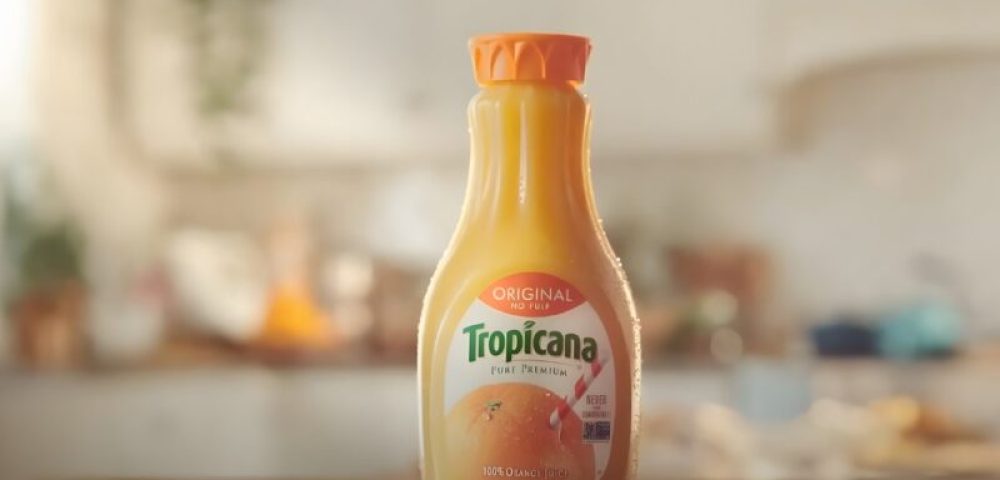For anyone exploring the world of vegan products, understanding the ingredients and production methods of everyday items like orange juice is essential. It’s a common misconception that all fruit juices are inherently vegan, but this isn’t always the case.
With the increasing interest in plant-based diets, it’s important to dive deeper into what we consume. Tropicana, a name synonymous with orange juice, offers a variety of products, but are they all suitable for a vegan lifestyle? This question might seem straightforward at first glance, but the answer is more complex than you might expect.
Key Takeaways
-
Examining the vegan status of products like Tropicana orange juice reveals the significance of ingredient awareness for individuals adhering to vegan diets or specific dietary needs.
-
The comparison between store-bought and homemade orange juices underscores the need to weigh factors like health benefits, taste, nutritional value, and convenience in our food choices.
So, There is a Non-Vegan Tropicana Orange Juice?
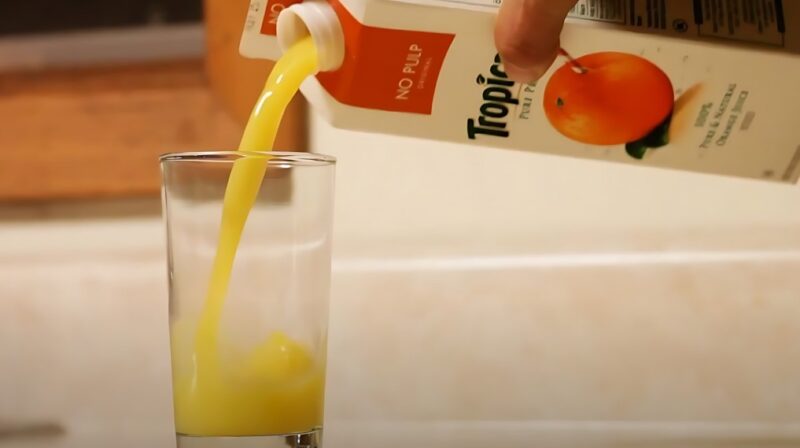
It might come as a surprise to many that not all orange juices are vegan-friendly, even those from renowned brands like Tropicana. The primary reason behind this anomaly lies in the addition of certain non-vegan ingredients used either for nutritional enhancement or to improve the product’s texture and shelf life.
Tropicana’s Pure Premium Healthy Heart Orange Juice serves as a prime example of this exception. This particular product deviates from the usual vegan-friendly profile due to the inclusion of ingredients like omega-3 fatty acids and gelatin, which are derived from animal sources.
Omega-3 fatty acids, often added for their heart health benefits, are typically sourced from fish oil or other marine animals. Gelatin, used as a stabilizer or thickener in food products, is derived from collagen obtained from various animal body parts.
Another non-vegan ingredient found in some Tropicana products is casein, a protein commonly sourced from milk. Casein is used to improve texture and provide a creamier mouthfeel, qualities that are particularly sought after in some fortified juice variants.
Furthermore, some orange juices may contain added vitamin D, which is often derived from lanolin (wool grease), making it unsuitable for a vegan diet.
| Ingredient | Description | Vegan Status |
|---|---|---|
| Concentrated Orange Juice | Pure squeezed orange juice | Vegan |
| Omega-3 Fatty Acids | Sourced from fish oil for heart health | Non-Vegan |
| Gelatin | Derived from animal collagen for texture | Non-Vegan |
| Casein | Milk protein for creaminess | Non-Vegan |
Are There Vegan Tropicana Juices?
Tropicana offers a variety of products that are perfectly suited for vegans.
Tropicana Trop50
This range includes varieties like No Pulp, Some Pulp, Orange Mango, and Orange Peach. These juices are not only vegan but also cater to those looking for lower-calorie options, as they contain 50% less sugar and calories compared to regular juices. They achieve this by using stevia, a plant-based sweetener, ensuring the product remains vegan-friendly.
These juices are ideal for those watching their sugar intake. The flavors are well-balanced, and the use of stevia doesn’t overpower the natural taste of oranges.
Original No Pulp Pure Premium Orange Juice
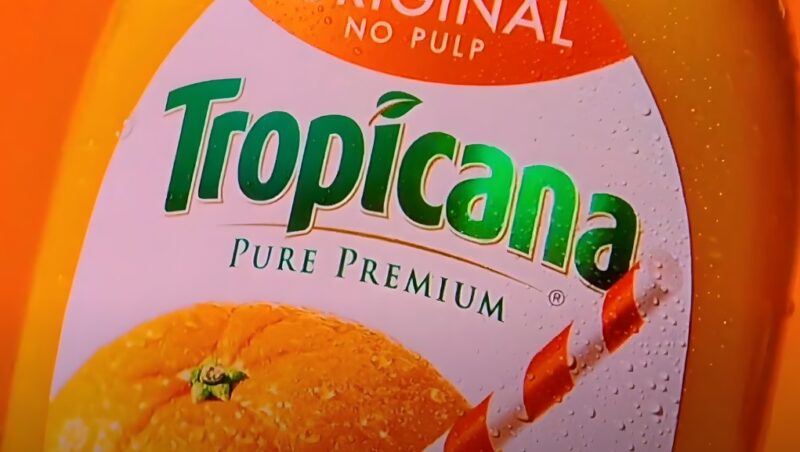
This product is simply orange juice, with no added animal derivatives. It offers the natural taste and nutritional benefits of oranges, such as high Vitamin C content, without any non-vegan concerns.
This juice is perfect for those who enjoy a smooth, pulp-free experience. It retains the full flavor of freshly squeezed oranges and is rich in natural nutrients.
Tropicana Orange Juice 100% Vitamin C Twister
Juice Burst is another noteworthy mention. This product focuses on delivering a high Vitamin C content, which is crucial for immunity and overall health. Like the others mentioned, it remains within the vegan domain by excluding any animal-derived ingredients.
This option is particularly appealing for its immune-boosting properties. It’s a great choice for a daily dose of Vitamin C, with a refreshing taste.
| Product | Calories | Sugar | Vitamin C | Ingredients |
|---|---|---|---|---|
| Original No Pulp Pure Premium | 110 per 8 oz | 22g per 8 oz | 100% Daily Value | 100% Orange Juice |
| Trop50 No Pulp | 50 per 8 oz | 10g per 8 oz | 100% Daily Value | Filtered Water, Orange Juice Concentrate, Natural Flavors, Stevia Leaf Extract |
| 100% Vitamin C Twister Juice Burst | 120 per 8 oz | 28g per 8 oz | 100% Daily Value | 100% Orange Juice |
Is Tropicana Better Than Other Brands?
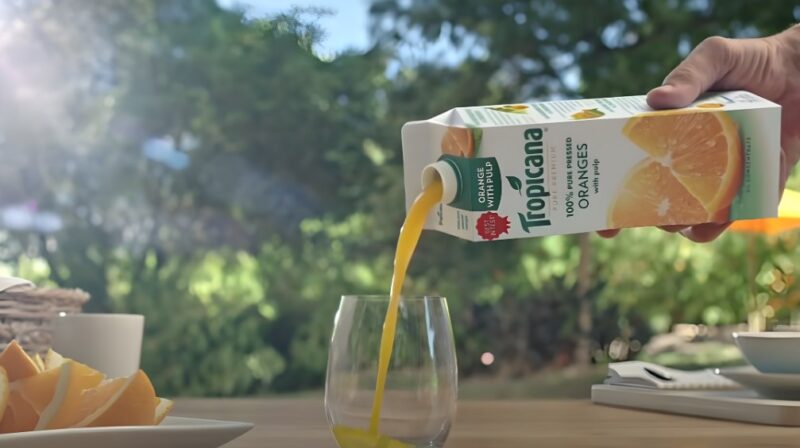
When comparing Tropicana’s orange juice options to those of other brands, several factors come into play, including taste, nutritional content, availability, and price. To provide a balanced view, let’s consider some popular brands alongside Tropicana: Simply Orange and Minute Maid.
Taste
Tropicana is known for its fresh and natural taste, often attributed to their ‘Grovestand’ variety, which is thicker and closer to the consistency of freshly squeezed juice. Simply Orange is also highly regarded for its taste, offering a similar experience to fresh juice. Minute Maid, while popular, is often perceived as slightly more processed in flavor.
Nutritional Content
Tropicana, Simply Orange, and Minute Maid all offer 100% orange juice options, which are rich in Vitamin C and free from added sugars and preservatives. Tropicana’s Trop50 line stands out for its reduced-calorie and lower-sugar content, using stevia as a sweetener, which is a unique offering compared to the other two brands.
Availability and Price
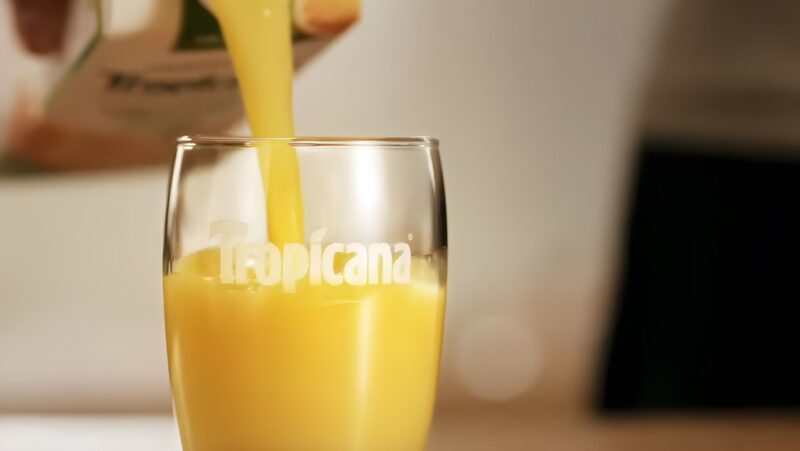
All three brands are widely available in most grocery stores. Tropicana and Simply Orange are similarly priced, while Minute Maid is often slightly cheaper. However, the price difference is not significant enough to be a decisive factor for most consumers.
Sustainability and Brand Ethics
Tropicana has made efforts towards sustainability, such as improving their packaging and sourcing. Simply Orange and Minute Maid, both owned by The Coca-Cola Company, also have sustainability initiatives, but consumer perceptions on their environmental impact vary.
| Brand | Taste | Nutritional Value (per 8 oz) | Price Range (per gallon) | Unique Selling Point |
|---|---|---|---|---|
| Tropicana | Fresh, natural | 110 calories, 22g sugar, 100% Vitamin C | $6.00 – $7.50 | Reduced-calorie Trop50 line |
| Simply Orange | Close to fresh juice | 110 calories, 23g sugar, 100% Vitamin C | $6.00 – $7.50 | High pulp options |
| Minute Maid | Slightly more processed | 110 calories, 24g sugar, 100% Vitamin C | $5.00 – $6.50 | More affordable |
Is It As Good as Homemade Orange Juice?
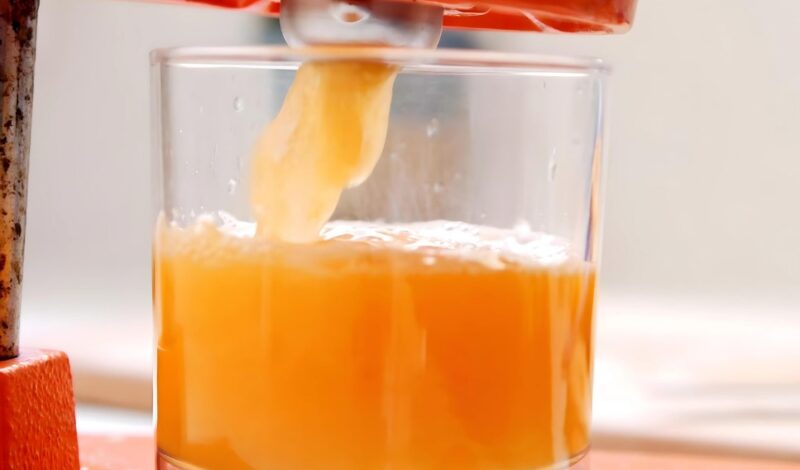
When comparing store-bought orange juices like Tropicana to fresh homemade orange juice, several key aspects must be considered: health benefits, taste, nutritional value, convenience, and cost.
Health Benefits
Fresh homemade orange juice is free from any additives, preservatives, and artificial flavorings, making it a healthier choice for those who are cautious about processed ingredients. However, it’s important to note that store-bought juices like Tropicana are often pasteurized, which helps eliminate bacteria and extends shelf life but can also reduce some nutrient levels.
Taste
The taste of fresh homemade orange juice is often considered superior due to its freshness and the absence of processing. It typically has a more vibrant and natural flavor compared to store-bought juices, which might lose some taste nuances during processing.
Nutritional Value
Homemade orange juice provides vitamins, minerals, and antioxidants directly from the fruit. However, it generally lacks the fortification found in some store-bought juices, such as added Vitamin D or calcium. Tropicana and other brands may also offer low-calorie options, which are not a direct feature of homemade juice.
Convenience
Store-bought orange juice offers convenience and consistency. Tropicana, for example, is readily available, has a longer shelf life, and requires no preparation. In contrast, homemade orange juice requires time and effort to prepare and has a shorter shelf life.
Cost

Making orange juice at home can be more cost-effective, especially if oranges are bought in bulk or in season. However, the cost can vary based on the type of oranges used and their availability in your region. Store-bought juice often comes with a higher price due to branding, packaging, and processing.
| Aspect | Fresh Homemade Orange Juice | Store-Bought Orange Juice (e.g., Tropicana) |
|---|---|---|
| Health Benefits | No additives or preservatives | Pasteurized, some nutrients may be reduced |
| Taste | Vibrant, fresh flavor | Consistent, may lose some freshness |
| Nutritional Value | Natural vitamins and minerals, no fortification | May include added vitamins and low-calorie options |
| Convenience | Requires preparation, shorter shelf life | Ready to drink, longer shelf life |
| Cost | Varies, can be cost-effective | Often higher due to processing and branding |
FAQs
Is Tropicana GMO Free?
Tropicana products, like their Pure Premium line, are non-GMO and do not contain genetically modified ingredients. They are committed to using oranges that are grown and harvested using traditional breeding methods.
Is Tropicana Made from Real Oranges?
Yes, Tropicana orange juice is made from real oranges. The juice is extracted from freshly picked oranges, ensuring a natural and authentic flavor in their products.
What is the Maximum Orange Juice per Day?
For adults, it is generally recommended to limit orange juice intake to about 8 ounces (240 milliliters) per day. Exceeding this amount can lead to excessive sugar intake and potential nutritional imbalances.
Is 100% Juice OK for Toddlers?
While 100% juice can be a part of a toddler’s diet, it should be given in moderation. The American Academy of Pediatrics suggests limiting juice intake to 4 ounces (118 milliliters) per day for toddlers aged 1-3 years.
Last Words
We have other suggestions and tips related to food and many other topics. For example, have you ever tried Raw Zucchini, there are ways to make a fresh salad with it, and it is delicious.

